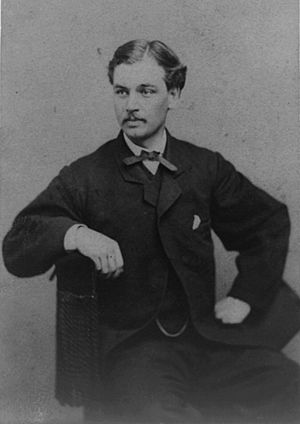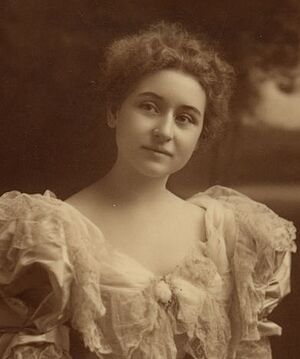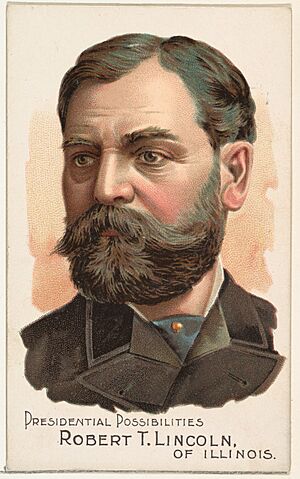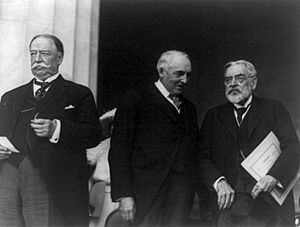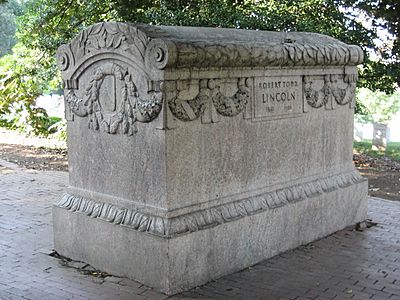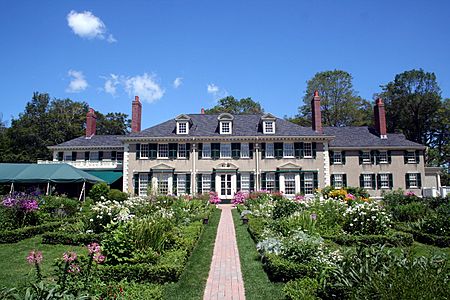Robert Todd Lincoln facts for kids
Quick facts for kids
Robert Todd Lincoln
|
|
|---|---|
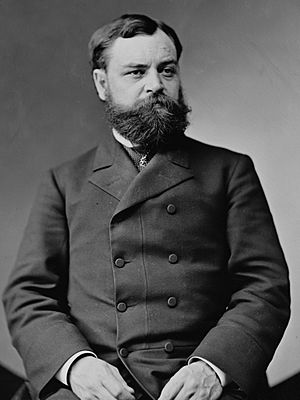
Portrait by Mathew Brady, c. 1870–1880
|
|
| 30th United States Minister to the United Kingdom | |
| In office May 25, 1889 – May 4, 1893 |
|
| President | Grover Cleveland Benjamin Harrison |
| Preceded by | Edward John Phelps |
| Succeeded by | Thomas F. Bayard (as Ambassador) |
| 35th United States Secretary of War | |
| In office March 5, 1881 – March 4, 1885 |
|
| President | James A. Garfield Chester A. Arthur |
| Preceded by | Alexander Ramsey |
| Succeeded by | William Crowninshield Endicott |
| Personal details | |
| Born |
Robert Todd Lincoln
August 1, 1843 Springfield, Illinois, U.S. |
| Died | July 26, 1926 (aged 82) Manchester, Vermont, U.S. |
| Resting place | Arlington National Cemetery |
| Political party | Republican |
| Spouse |
Mary Eunice Harlan
(m. 1868) |
| Children |
|
| Parents | Abraham Lincoln Mary Todd Lincoln |
| Relatives | Lincoln family |
| Education | Harvard University (AB) Northwestern University (LLB) |
| Signature | |
| Military service | |
| Allegiance | United States |
| Branch/service | Union Army |
| Years of service | February 11 – June 12, 1865 |
| Rank | |
| Battles/wars | American Civil War |
Robert Todd Lincoln (born August 1, 1843 – died July 26, 1926) was an American lawyer, businessman, and politician. He was the oldest son of President Abraham Lincoln and Mary Todd Lincoln. Robert Lincoln became a successful lawyer and company president. He also served as the U.S. Secretary of War and the U.S. Ambassador to the United Kingdom.
Lincoln was born in Springfield, Illinois. He graduated from Harvard College. Later, he served as a captain in the Union Army during the final days of the American Civil War. He was on the staff of General Ulysses S. Grant. After the war, he married Mary Eunice Harlan. They had three children together. He finished his law studies in Chicago and built a successful law practice. He became wealthy by working for large companies.
Lincoln was active in the Republican party. People often thought he might run for president. However, he never tried to start a campaign. He was elected as a town supervisor in South Chicago from 1876 to 1877. This town later became part of Chicago. Lincoln served as United States Secretary of War for Presidents James A. Garfield and Chester A. Arthur. He was also the U.S. Minister to the United Kingdom under President Benjamin Harrison.
Lincoln became a lawyer for the Pullman Palace Car Company. After the company's founder, George Pullman, died in 1897, Lincoln became its president. He retired from this job in 1911 but stayed as chairman of the board until 1922. In his later years, Lincoln lived in Washington, D.C. and Manchester, Vermont. His home in Manchester, Hildene, became a historic place in 1977. In 1922, he attended the dedication of the Lincoln Memorial. Lincoln died at Hildene on July 26, 1926, just before his 83rd birthday. He was buried at Arlington National Cemetery.
Contents
Early Life and Education
Robert Todd Lincoln was born in Springfield, Illinois, on August 1, 1843. His parents were Abraham Lincoln and Mary Todd Lincoln. He had three younger brothers: Edward, William, and Tad. When Robert was born, his father was a well-known member of the Whig political party. This party was one of the two main political parties in the U.S. at the time. Robert was named after his mother's father, Robert Smith Todd.
When his father became president, Robert was the only one of his children who was old enough to live on his own. In 1859, he took the entrance exam for Harvard College. He failed 15 out of 16 subjects. To prepare better, he then went to Phillips Exeter Academy. He graduated from there in 1860. He was accepted into Harvard and graduated in 1864. While at Harvard, he was elected vice-president of the Hasty Pudding Club. He was also a member of the Delta Kappa Epsilon fraternity.
Civil War Service
After graduating from Harvard, Lincoln started at Harvard Law School. He attended law school from September 1864 to January 1865. He left after four months to join the Union Army. In 1893, Harvard gave him an honorary law degree.
Robert's mother, Mary Todd Lincoln, did not want him to join the Army. She prevented him from joining until just before the war ended. She told President Lincoln that losing another son would be too much for her. President Lincoln believed their son was no more important than other people's sons. But Mary Todd Lincoln insisted she could not bear the danger. In January 1865, she finally agreed. President Lincoln then asked Ulysses S. Grant if Robert could join his staff.
On February 11, 1865, Lincoln became an assistant adjutant with the rank of captain. He served on General Grant's staff during the last weeks of the American Civil War. This meant he likely would not be in actual combat. Still, his father was very proud. He was present at Appomattox when General Lee surrendered. He left the Army on June 12, 1865, and returned to civilian life.
A Famous Rescue
Robert Lincoln was once saved from danger by Edwin Booth. Edwin Booth was the brother of John Wilkes Booth, who later assassinated Robert's father. This event happened on a train platform in Jersey City, New Jersey. The exact date is not known, but it was likely in late 1863 or early 1864. This was before John Wilkes Booth killed President Lincoln on April 14, 1865.
Robert Lincoln later told a fellow officer, Colonel Adam Badeau, about the event. Badeau was a friend of Edwin Booth's. Badeau wrote a letter to Booth, praising him for his heroic act. Before getting the letter, Booth did not know that the man he saved was the president's son. Knowing he had saved Lincoln's son was said to be a comfort to Booth after his brother's terrible act. General Grant also sent Booth a letter of thanks.
Family Life
Some people thought Robert had a distant relationship with his father. This was partly because Abraham Lincoln was often away for work. Robert remembered his father being "almost constantly away from home." He recalled seeing his father pack saddlebags for his travels. However, Robert deeply admired his father. He cried openly at his father's deathbed. Robert worked hard to protect his father's memory. He disagreed with Lincoln's biographer, William Herndon, about some things Herndon said.
On the night his father died, Robert had been invited to go to Ford's Theatre with his parents. He declined because he was tired from his time at the battlefront.
After his father's assassination in April 1865, Robert moved to Chicago with his mother and brother. He took law classes at the Old University of Chicago (now Northwestern University Pritzker School of Law). He also studied law at a firm in Chicago. On January 1, 1866, Lincoln moved into his own rooms in downtown Chicago. He wanted to live more comfortably than he had with his family. Lincoln earned his law degree from Northwestern University in 1866. He became a licensed attorney in Chicago on February 22, 1867.
Marriage and Children
On September 24, 1868, Lincoln married Mary Eunice Harlan (1846–1937). She was the daughter of Senator James Harlan. They had three children: two daughters and one son.
- Mary "Mamie" Lincoln (1869–1938)
- Abraham Lincoln II (nicknamed "Jack"; 1873–1890)
- Jessie Harlan Lincoln (1875–1948)
In the summer, Robert, Mary, and their children often left the hot city. They went to the cooler climate of Mount Pleasant, Iowa. They stayed at the Harlan family home. The Harlan-Lincoln home, built in 1876, is still there today. Mary Harlan Lincoln gave it to Iowa Wesleyan College in 1907. It is now a museum with items from the Lincoln family.
Of Robert's children, Jessie Harlan Lincoln Beckwith (1875–1948) had two children. Neither of them had children of their own. Robert's other daughter, Mary Todd Lincoln ("Mamie") (1869–1938), married Charles Bradford Isham. They had one son, Lincoln Isham (1892–1971). He married but died without children.
The last known person directly related to Abraham Lincoln was Robert's grandson, Robert Todd Lincoln Beckwith. He died in 1985.
Relationship with Mary Todd Lincoln
In 1871, Robert's last surviving brother, Tad, died at age 18. This left his mother, Mary Todd Lincoln, very sad. Robert was worried about his mother's behavior. He thought she was spending too much money and having strange thoughts. Fearing for her safety, he arranged for her to go to a special hospital in Batavia, Illinois, in 1875.
With his mother in the hospital, Robert managed her money. He used his own money to pay for her care. He felt it was his duty to protect her as the head of the family. He hoped she would get better and have her freedom back. On May 20, 1875, she arrived at Bellevue Place. This was a private, high-quality hospital.
Three months later, Mary Lincoln managed to leave Bellevue Place. She secretly sent letters to her lawyer and a friend. She also wrote to a newspaper. Soon, the public began to question Robert's actions. The hospital director, who had said Mary would benefit from treatment, then said she was well enough to live with her sister. These events caused a strain between Robert and his mother. They may not have fully made up before her sudden death from a stroke.
Political Career
Secretary of War (1881–1885)
From 1876 to 1877, Lincoln served as the Town Supervisor of South Chicago. This town later became part of Chicago. In 1877, President Rutherford B. Hayes offered him a job as Assistant Secretary of State, but he turned it down. Later, President James A. Garfield appointed him Secretary of War. He served from 1881 to 1885 under President Garfield and then President Chester A. Arthur.
During his time as Secretary of War, the Cincinnati Riots of 1884 happened. These riots started because a jury gave a light verdict in a murder case that many thought was unfair. Forty-five people died during three days of rioting. U.S. troops sent by Lincoln helped bring calm back to the city.
After being Secretary of War, Lincoln helped start the Illinois Industrial Training School for Boys in 1887. This school helped homeless and neglected boys. It later moved and is now called Glenwood Academy.
Republican Politics
From 1884 to 1912, people often talked about Lincoln as a possible candidate for president or vice-president. However, he always said he was not interested. He stated he would not accept a nomination for either position. His picture was even on a set of "Presidential Possibilities" cards in 1888.
Minister to the United Kingdom
Lincoln served as the U.S. minister to the United Kingdom from 1889 to 1893. He served under President Benjamin Harrison. During this time, Lincoln's teenage son, Abraham II, died in Europe. After his time as minister, Lincoln returned to his private law business.
Later Life and Career
Lincoln was the main lawyer for the Pullman Palace Car Company. After the founder, George Pullman, died in 1897, Lincoln became president of the company. In 1911, Lincoln became chairman of the Pullman Company board. He held this position until 1924.
Lincoln was also an amateur astronomer. He had an observatory built at his home, Hildene. A large telescope was installed there in 1909. Lincoln's telescope and observatory have been fixed up. A local astronomy club used it in the early 2000s.
Lincoln also enjoyed playing golf. He was the president of the Ekwanok Country Club in Manchester.
Robert Lincoln's last public appearance was on May 30, 1922. He attended the dedication ceremony for his father's memorial in Washington, D.C.
Death and Burial
Robert Todd Lincoln died in his sleep at Hildene, his Vermont home, on July 26, 1926. This was just a week before his 83rd birthday. His doctor said he died from a cerebral hemorrhage caused by hardening of the arteries.
Robert had wanted to be buried with his family in the Lincoln Tomb in Springfield. But two weeks after his death, his widow, Mary Harlan Lincoln, had a new idea. She felt he was an important person who made his own history. She believed he should have his own special resting place.
Lincoln's body was buried at Arlington National Cemetery. His tomb was designed by the sculptor James Earle Fraser. He is buried with his wife, Mary, and their son, Abraham II ("Jack"). Jack had died in London, England, in 1890 at age 16. After Jack's death, Robert wrote that there was a "great blank" in their lives.
-
Robert Todd Lincoln's mansion Hildene in Manchester, Vermont
Legacy and Impact
Historians often see Robert Todd Lincoln as a "tragic figure." Lincoln once said that people wanted him for his jobs because he was Abraham Lincoln's son. However, he accepted these roles and became a very wealthy lawyer and businessman. He enjoyed the life of a rich, conservative gentleman. He was different from his father, who was known for his humor and down-to-earth nature. Robert was often described as cold and formal.
Fanny Seward, the daughter of Secretary of State William H. Seward, described him as "agreeable, good-natured, and intelligent." She also said he had "considerable humor."
Lincoln was the last living member of the cabinets of Presidents Garfield and Arthur. He was also the last living witness of General Lee's surrender at Appomattox. The Lincoln Sea, a body of water in the Arctic Ocean, was named after him. This happened during an Arctic expedition in 1881–1884.
Cultural Depictions
Robert Todd Lincoln has been shown in many films, TV shows, and plays.
Films
- Edwin Mills in Abe Lincoln in Illinois (1940)
- Joseph Gordon Levitt in Steven Spielberg's Lincoln (2012)
Television
- Kieran Mulroney in Tad (1995)
- Gregory Cooke in the miniseries Lincoln (1988)
- Wil Wheaton in The Day Lincoln Was Shot (1998)
- Brett Dalton in Killing Lincoln (2013)
- Neal Bledsoe in Timeless (2016)
- James Carroll Jordan in Sandburg's Lincoln (1974)
Stage Plays
- Michael Cristofer in The Last of Mrs. Lincoln (1976). This play was also shown on TV.
See also
 In Spanish: Robert Todd Lincoln para niños
In Spanish: Robert Todd Lincoln para niños
- List of people on the cover of Time Magazine: 1920s – March 8, 1926
- Lincoln family tree


